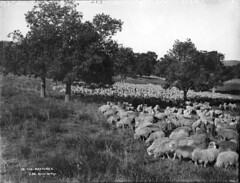| Image by Powerhouse Museum Collection via Flickr Raising sheep on grass is common in Australia. |
Editor's note: Today, I discuss grass-fed beef, lamb, milk, cheese and eggs, all of which are available in North Jersey.
The phrase "all natural" is thrown around with abandon, but there are no government or food industry standards to enforce it.
The best you can do is to look for meat and dairy products from animals that are treated humanely and raised on their natural diets -- free of antibiotics, growth hormones and animal byproducts.
Chief among them are pasture-raised Australian beef and lamb sold at ShopRite supermarkets, Costco Wholesale and other stores.
Unfortunately, labels carry little information on how cattle and sheep are raised in Australia, but ShopRite sales fliers call the beef -- sold under the Nature's Reserve brand -- "All Natural, Free Range, Grass Fed."
I was told by Meat and Livestock Australia Ltd. (MLA) that Nature's Reserve beef comes exclusively from cattle that are fed grass from start to finish. They are never confined to a feed lot, but they do receive some growth hormones.
The racks and boneless legs of lamb sold under the Costco label, Kirkland Signature, or sold without that label, such as the lamb osso bucco I saw last week in the Hackensack warehouse store, are from sheep raised in the same way-- except they do not receive any growth hormones.
Originally, MLA told me no growth hormones were used in beef sold under the Nature's Reserve label, but later corrected that.
Cattle and sheep stomachs are designed to turn grass into protein. When cattle are fed grain -- as the vast majority in the United States are to speed growth -- they can become sick.
And the wide use of animal antibiotics is making humans resistant to prescribed antibiotics.
Nature's Reserve steaks, roasts and whole beef tenderloin for filet mignon are sold at ShopRite for about $6.99 a pound and even less when they are on sale.
The meat is lean and contains beneficial Omega 3 fatty acids. It cooks quicker than conventional beef and is best when prepared medium rare.
I once saw grass-fed steaks from New Jersey on sale at Whole Foods Market in Paramus for $9.98 a pound, and the Fairway Market across town sold grass-fed, rib-eye steaks for $14.99 a pound and grass-fed burgers for $5.99 a pound in June 2010.
On Saturday, Costco's prices for Australian grass-fed lamb were $5.99 a pound for the boneless leg, $7.99 a pound for loin chops and $13.99 a pound for racks.
Before I stopped eating meat nearly two years ago, the small lamb chops in the rack were my favorite. I would trim the rack and cut it apart, broiling the chops only until they were rare. They would literally melt in my mouth.
Of course, you don't taste the grass. But the meat is so pure and flavorful, compared to conventionally raised lamb, it needs little more than a bit of salt.
The current price of $13.99 a pound for a rack of lamb chops at Costco compares to the price I recall from a couple of years ago, $9.99 a pound.
The Australian whole beef tenderloin was ideal for slicing thin, marinating with Korean barbecue sauce and cooking quickly on a stove-top grill before wrapping the beef in red-leaf lettuce with rice, kimchi and garlic at the table.
Grass-fed beef and lamb are among several products from pasture-raised animals available in North Jersey.
Fairway Market sells milk from grass-fed cows. Trader Joe's has sharp cheddar cheese made with milk from pasture-raised cows in New Zealand ($5.49 a pound).
On Friday, for $5, I picked up two dozen Grade A Large Brown Eggs "from grass-fed hens with freedom in the field" at H Mart, the Korean supermarket in Englewood. The yolks are a healthy shade of yellow.
They are distributed by Swiss Villa LLC in Lykens, Pa., with a label that tells you the package is made from recycled PET, fewer than 350 hens forage on a pesticide-free acre of pasture "spring to fall," and the eggs come from "Swiss-peasant-descendant, small-scale farmers."
"You would enjoy seeing the hens scatter out over the pasture meadow each morning as dew droplets mirror the rising sun," the label says.
I'm sure I would, as long as I was served a breakfast of their eggs right away.
Here are Web sites to help you find grass-fed meat.
Australian Lamb
The site lists Costco Wholesale and Stop and Shop supermarkets as sources of Australian lamb. Some brands to look for are Country Meadow Austral American Lamb and Opal Valley.
Australian Beef
ShopRite and Pathmark supermarkets in North Jersey are listed as sources.
Meat and Livestock Australia Ltd.
Meat and Livestock Australia is a marketing, research and development agency that represents ranchers, processors, exporters and others involved in meat production in Australia.
To take a virtual farm visit in Australia, click on this link:
On a Farm Down Under


No comments:
Post a Comment
Please try to stay on topic.